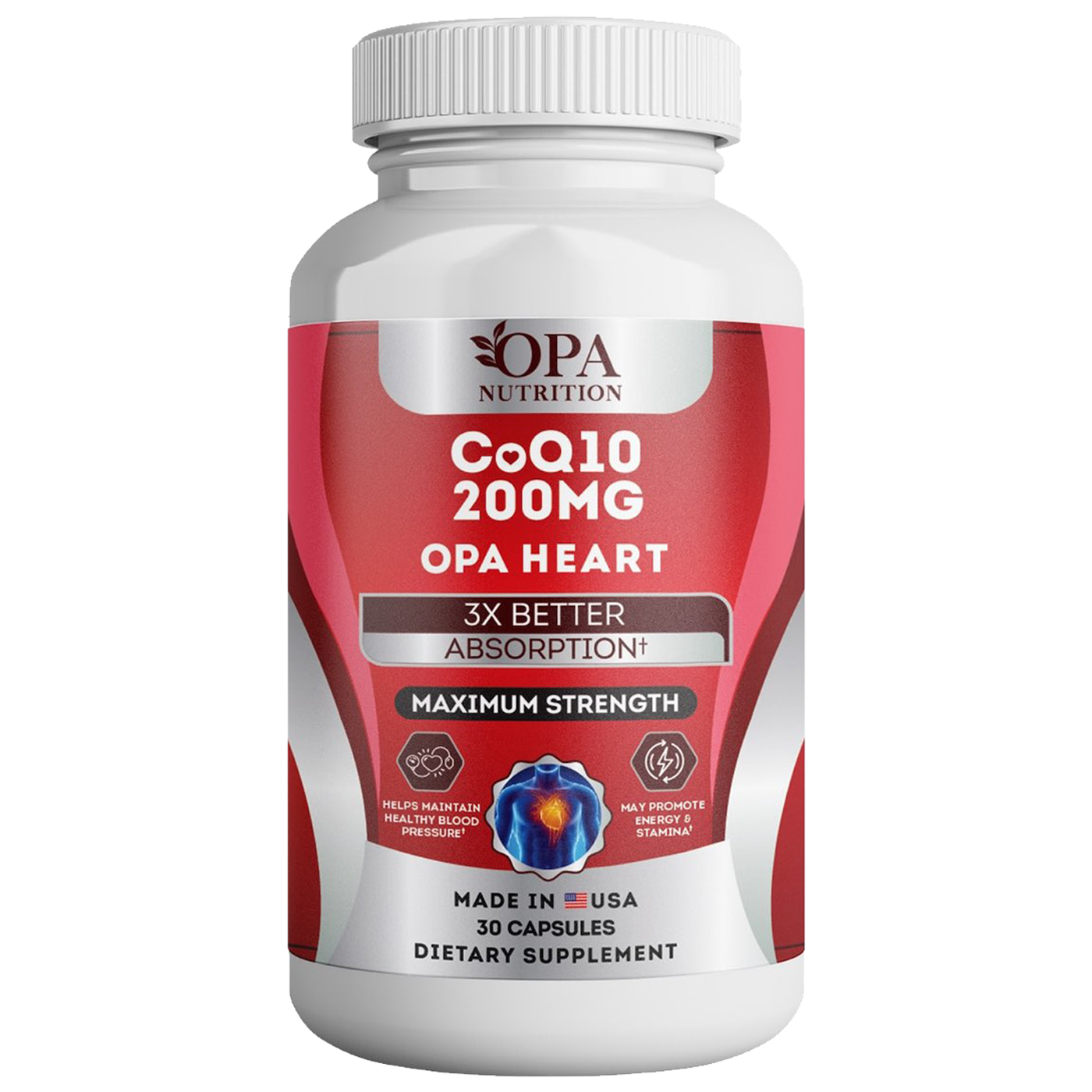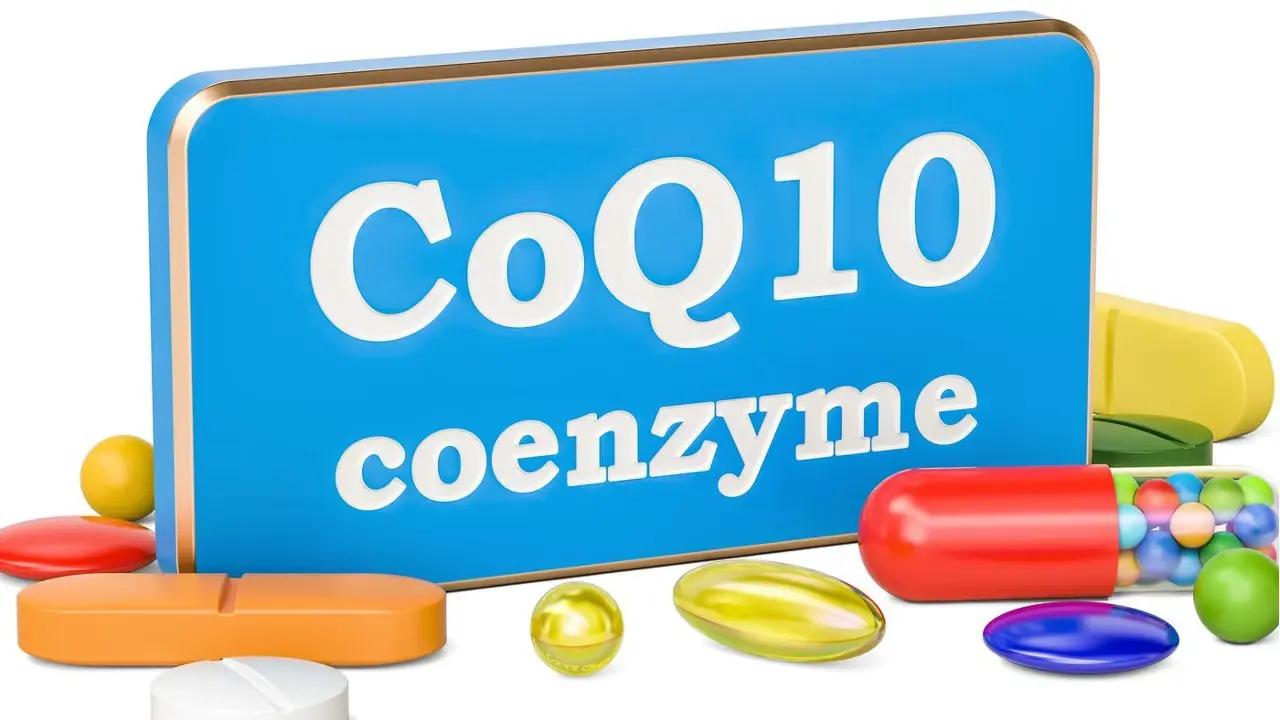What Does CoQ10 Do? - CoQ10 is a natural compound that exists in cells and helps produce the energy your body needs. It is a vital nutrient needed by every cell, and can be found in foods such as beef, spinach, broccoli and avocado. The more active you are or the older you get, the more important it is to have enough CoQ10 in your diet.
CoQ10 has many health benefits that include reducing inflammation, fighting free radicals, supporting cardiovascular health, aiding in weight loss, boosting energy levels and helping to improve sleep quality. If you decide to start a CoQ10 regimen, then make sure to read our When to Take CoQ10: Morning or Night or What is Coenzyme articles.

OPA Heart
The #1 CoQ10 for Heart Health
What is CoQ10 and what does it do?
You may be wondering what is CoQ10 good for but it's mainly known for its heart-health benefits. It helps keep your heart functioning properly by providing energy to the heart muscle. It can also help lower blood pressure and protect against heart disease. CoQ10 may also help improve symptoms of diabetes and Parkinson’s disease.
If you’re looking to increase your CoQ10 levels, consider eating more of the following foods: lean beef, sardines, salmon and chicken. You may also want to consider taking a supplement or using consumer products that contain coenzyme Q10 in them.
If you’d like more information on how CoQ10 can boost your health benefits, check out OPA Heart CoQ10 200mg capsules.
How can CoQ10 improve your health?
There are many ways that CoQ10 can improve your health. First, CoQ10 is essential for energy production. If you are someone who is active or has a lot of energy, you need more CoQ10 than someone who is inactive or older. CoQ10 also helps keep your heart healthy by lowering cholesterol levels and preventing blood clots. It can also improve your immune system and help protect you from disease.
What are the best sources of CoQ10 to eat?
There are a few different ways to get CoQ10 into your diet. The first is by eating foods that are naturally high in CoQ10. Some of the best sources include beef, spinach, broccoli and avocado. If you're not a fan of red meat, fear not – chicken and fish are also good sources of CoQ10.
If you're looking for a supplement to help boost your levels, there are a number of different options available. You can find CoQ10 in pill form, or as an oil that can be added to food or drinks. Speak to your doctor or pharmacist before starting any new supplements to make sure they're right for you.
CoQ10 is a vital nutrient needed by every cell in the body, and is important for helping to regulate blood pressure, support your immune system and help control inflammation levels.
It's especially important for allowing your body to produce energy efficiently, by producing adenosine triphosphate (ATP), which is the fuel used by cells to do their job. If you are leading an active lifestyle or are getting older, you're going to need more CoQ10 in your diet.
How much CoQ10 do you need each day for optimal health benefits?
How much CoQ10 do you need each day? Most people don't need more than 100-200 mg per day. You can get CoQ10 from food or supplements, but it's important to talk to your doctor before starting a supplement regimen.
CoQ10 is a natural compound that exists in cells and helps produce the energy your body needs. It is a vital nutrient needed by every cell, and can be found in foods such as beef, spinach, broccoli and avocado. The more active you are or the older you get, the more important it is to have enough CoQ10 in your diet.
CoQ10 is also an antioxidant, which means it helps protect your cells from damage. It's important for maintaining a healthy heart, immune system and blood pressure. The recommended daily dose for most people is at least 30mg every day to maintain optimal health benefits, although some studies have suggested that doses of up to 200mg per day are safe.
However, CoQ10 supplements should only be taken under medical supervision because it can interact with certain medications. It is thought that people with heart disease, high blood pressure or congestive heart failure could benefit from taking CoQ10 supplements under the guidance of their doctor. Children are also advised to take a smaller dose, because it can affect energy levels and cause nausea in large doses.
What are the Best Sources of CoQ10
The best source of CoQ10 is food — especially organ meats like liver. Other good sources of CoQ10 include beef, sardines, snapper and wild game. Plant-based foods like spinach and broccoli are also rich in CoQ10.
You can find high levels of CoQ10 in energy drinks because it helps produce ATP (adenosine triphosphate), the energy that fuels our muscles. It is also added to sports drinks to enhance endurance and promote stamina.
Why do People take CoQ10
A majority of people take CoQ10 as a supplement because it is thought to treat a wide range of conditions from heart failure and Parkinson's disease to Alzheimer's. However, there is little evidence that taking CoQ10 supplements benefits healthy people.
One study has suggested that taking a CoQ10 supplement could help prevent breast cancer, but more research is needed to prove this effect. Preliminary research from Japan also suggests that taking 200mg of CoQ10 every day may improve the symptoms associated with overactive bladder syndrome, such as an urgent need to go or incontinence.
There are few reports of side effects from taking CoQ10 supplements, but some people have reported mild nausea or heartburn. As with any nutritional supplement, pregnant women should seek professional advice before taking it.
Final Thoughts on What Does CoQ10 Do
CoQ10 is an essential nutrient that you need to consume on a regular basis. It can be found in many foods, but it’s also available as a supplement if your diet doesn't provide enough of the nutrient naturally. The more active you are or the older you get, the more important Coenzyme Q10 becomes for optimal health benefits and improved energy levels. You should aim to take at least 100mg of CoQ10 per day; this amount may vary depending on how much physical activity someone does on a daily basis and their age. We hope this article has helped answer any questions about what exactly CoQ10 is, its importance for your body's cells, and why it's so crucial for your overall health!






